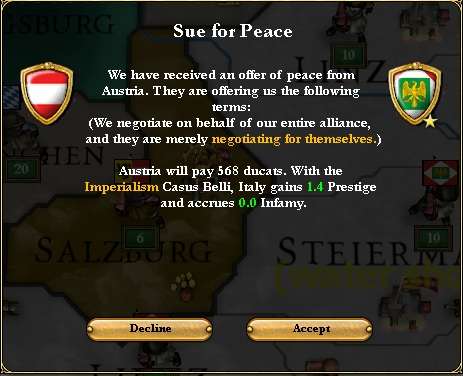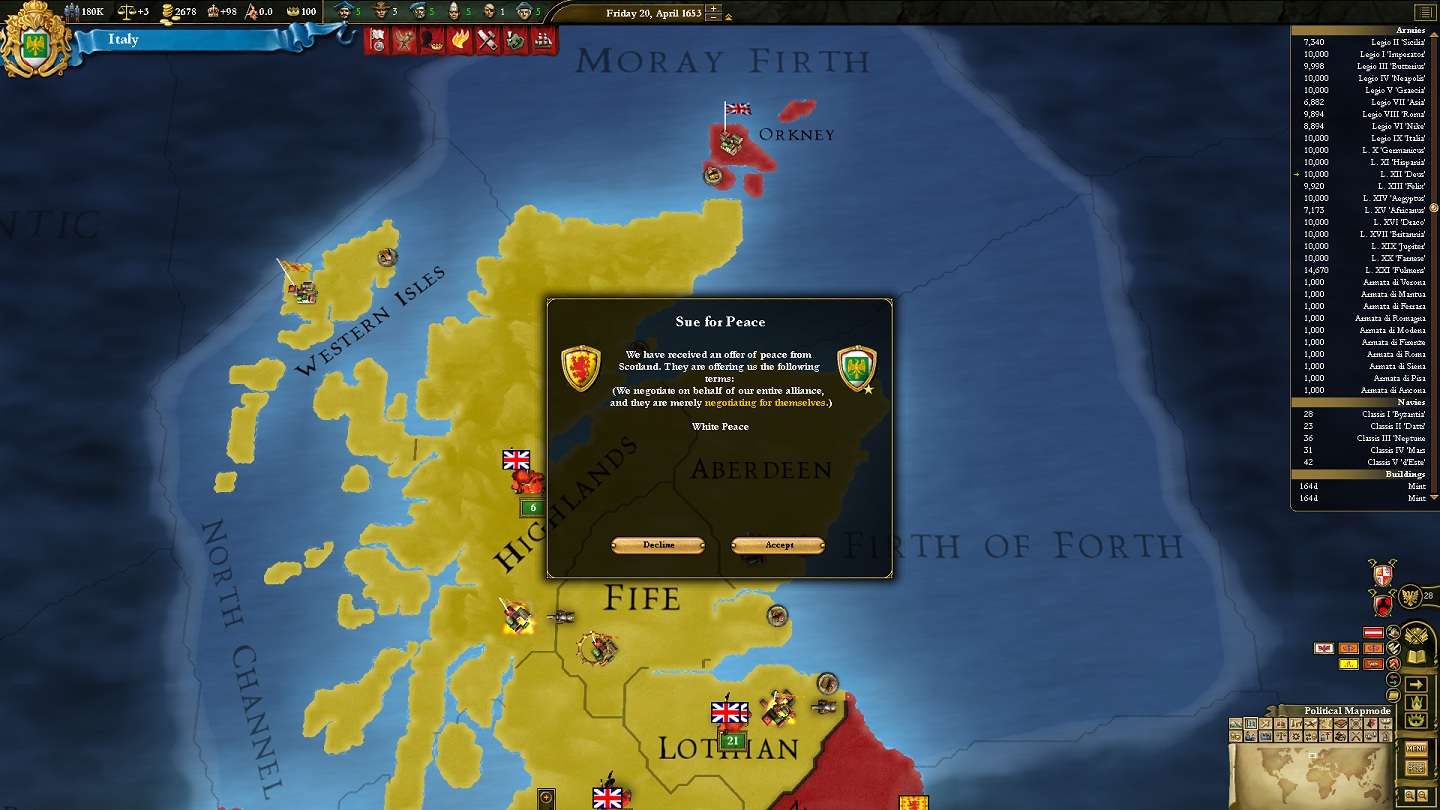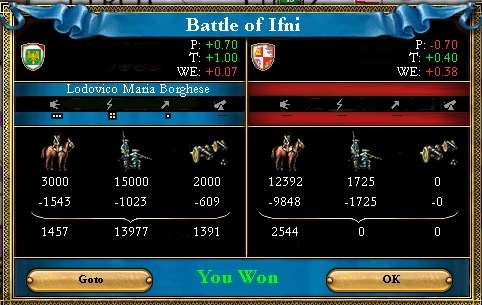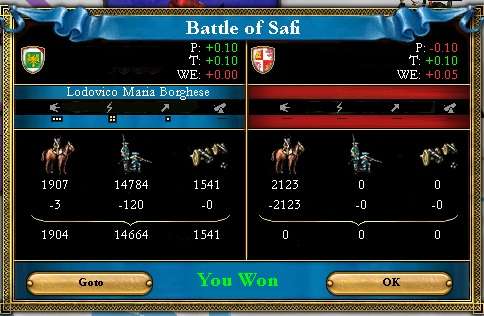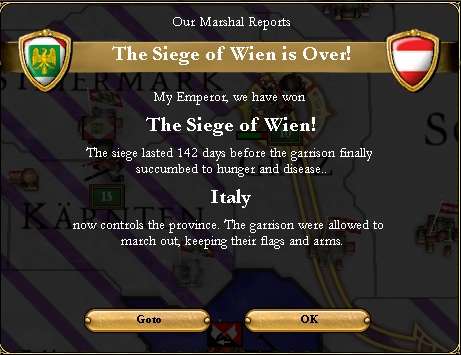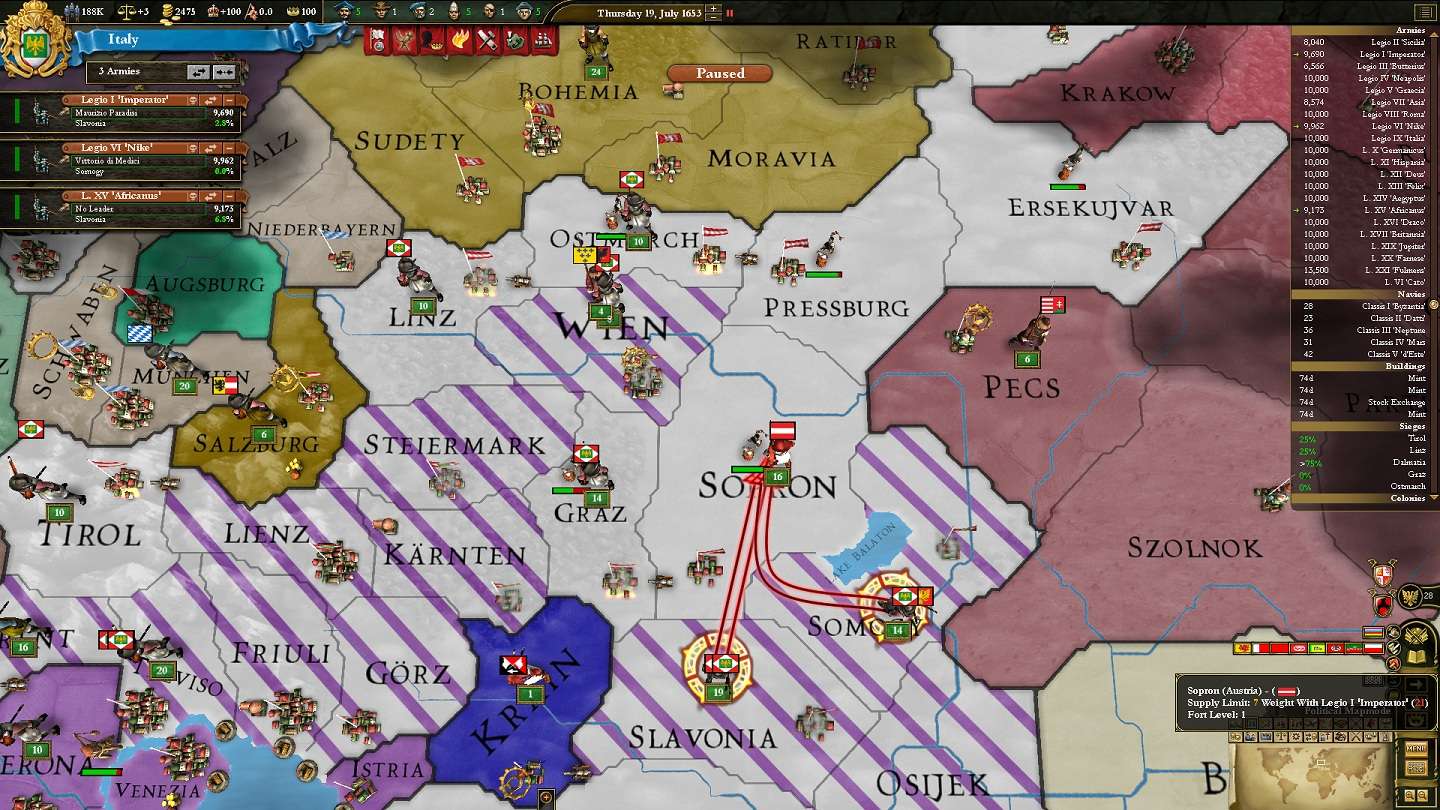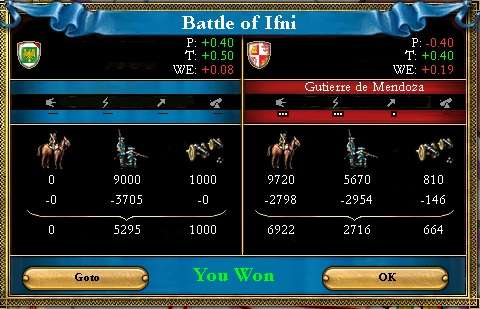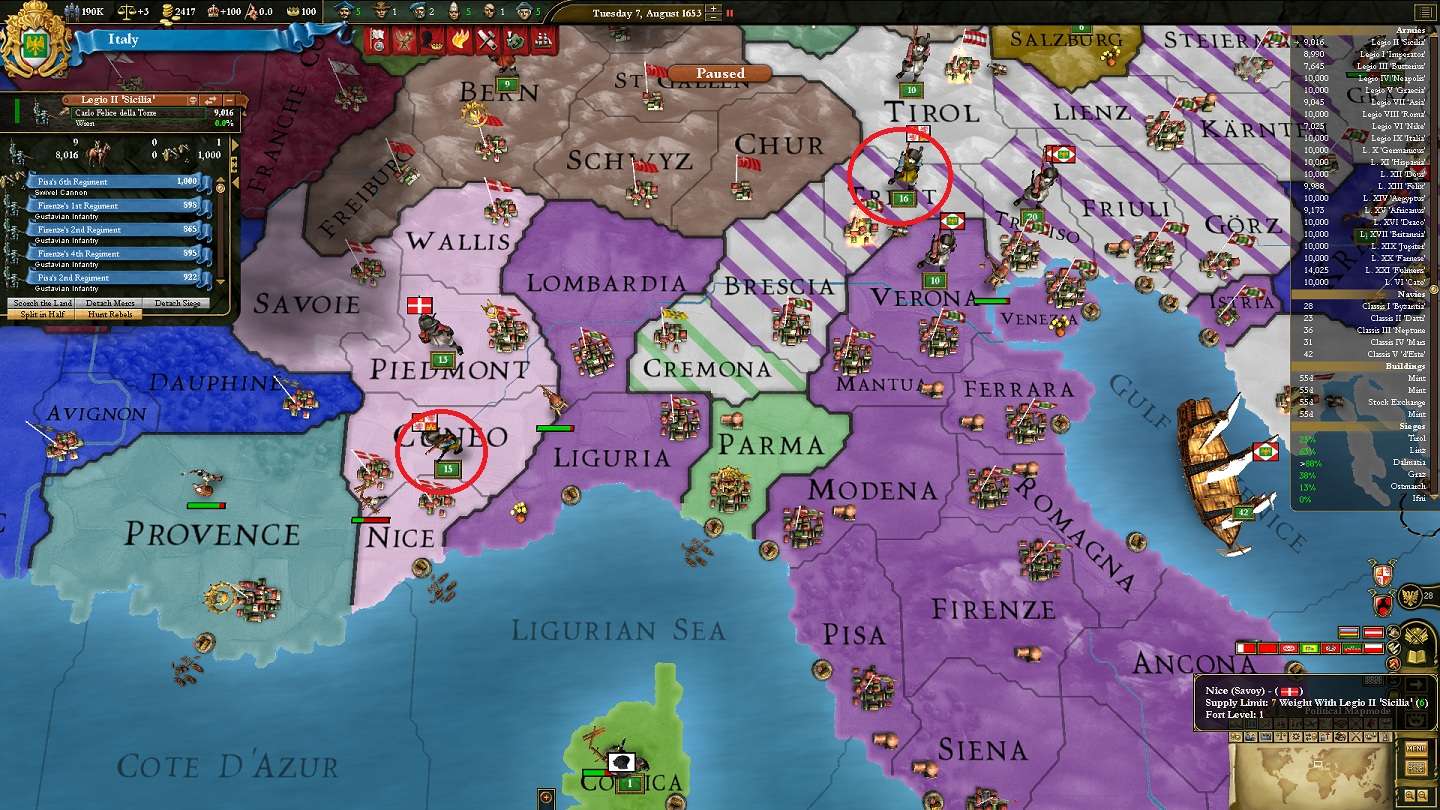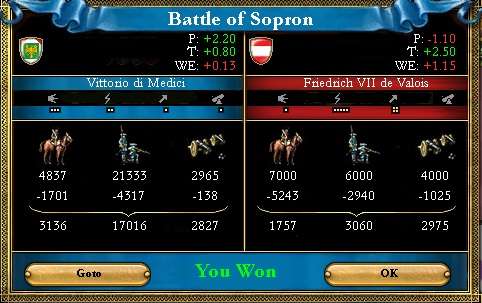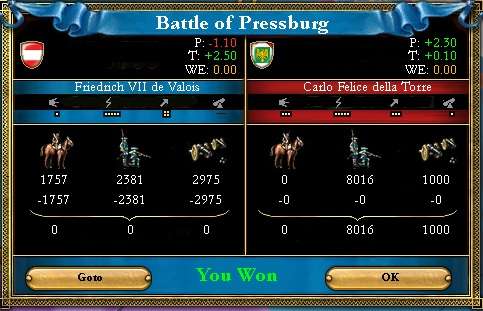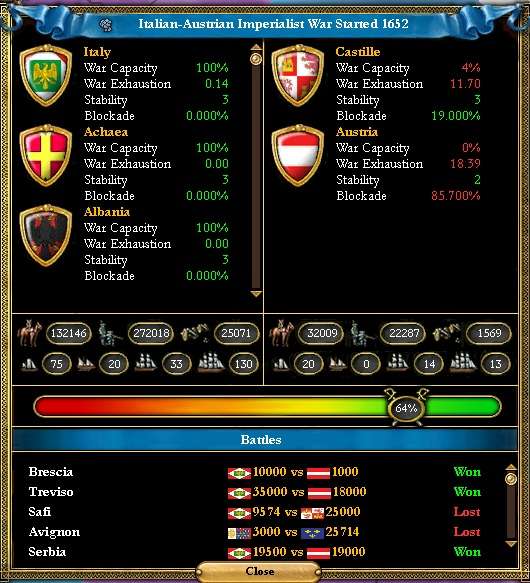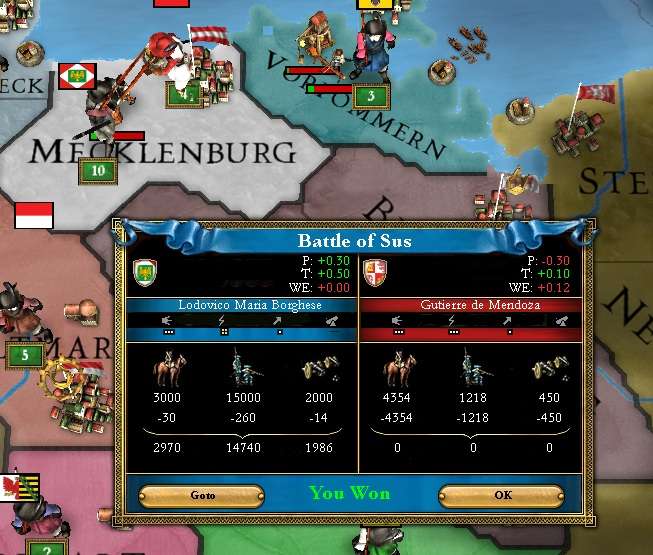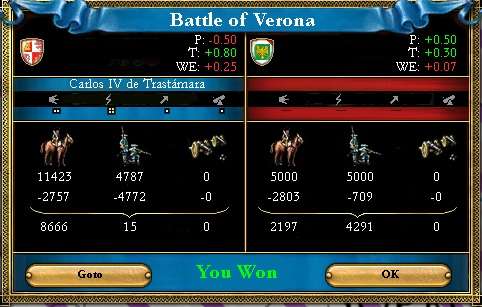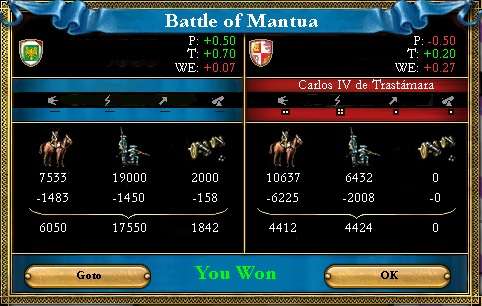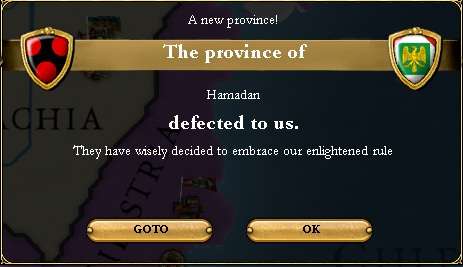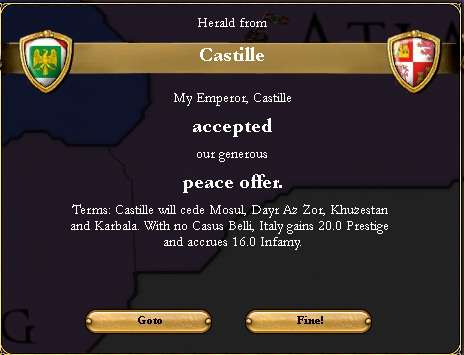Chapter 36, part 4: To the victor go the spoils
20 April 1653, the Foreign Minister's office, Rome
For once, Lan Zhu found himself remaining in Rome when a peace deal needed to be negotiated. Perhaps the Foreign Minister finally respected his loyal subordinate.
More likely, thought the Manchurian,
Carlo's just angry that I got the credit for the Austrian peace offer.
On 16 April, the Austrian ambassador had requested an audience with the Foreign Minister. Di Ferrari, as usual, was out the night before, drinking too much wine and dancing with far too many girls. The hungover playboy Count foisted the meeting on to Lan Zhu, thinking all the Ambassador had was a meaningless offer of white peace. It turned out to be far more substantive.
568 ducats would have represented about one fifth of the Empire's entire treasury, a not inconsiderable sum. Acting on his own initiative, Lan Zhu rode to Florence and presented the proposal directly to the Emperor. Francis II was so pleased at this sign of weakness that he granted his Manchu friend a patent of nobility on the spot -- Lan Zhu was now an Aedile. The position had originally been limited to the assistants of each Proconsul, but under Emperor Alexander the rank now applied to many civil service bureaucrats.
Francis II immediately replied, politely but firmly rejecting the offer. The Foreign Minister was unsurprisingly disappointed that he missed out on the opportunity, and so had insisted on traveling to Glasgow personally to negotiate a peace with Scotland. His reward for returning with a white peace was a firm handshake and a pat on the back.
Lan Zhu wasn't sure what made him happier; that the Foreign Minister now had to treat him with respect and call him "Aedile Lan" instead of "hey, you", or that the Foreign Minister got nothing for a very uncomfortable journey.
Either way, he now knew he belonged.
----------------------------------------------------------------------------------
4 June 1653, Safi, North Africa
Ludovico Maria Borghese, unusually for many Generals, took his brother's disgrace as a warning sign that he had better improve his record. He'd not really taken his promotion seriously, which was certainly fair, since he hadn't really been given an important assignment. However, his embarrassing defeats threatened to relegate his career to a violent and unpleasant end.
Borghese wasn't actually a bad General; he was just very conscious about his career, and had tried to use what little leverage he thought he had in an unpleasant situation. His holding the African theater hostage in exchange for a promotion had worked -- he was a General, after all -- in the short run. The recent debacles for both Borghese and his family had convinced him to virtually reinvent himself, to pay far more attention to his men, to essentially treat the African theater as if he were fighting off Castillian and Austrian hordes at the gates of Rome itself. The Battle of Ifni was a very pleasant result.
Even better, he pursued the Castillians and routed their army at the Battle of Safi.
For once, the monthly army digests had nice things to say about a Borghese, as well as reporting the capture of Gorz, Lienz, and Luristan.
----------------------------------------------------------------------------------
5 July 1653, Vienna, Austria
Chief of the General Staff Alexander O'Connor hadn't been outside Florence in weeks; the Emperor's impromptu decision to have the entire War Council join the parades marching through Vienna was a welcome change, almost as welcome as handing the Legionary eagle to a newly reconstituted Legio VI 'M. Cato'.
Even better, he got to take his young son, David, along. David O'Connor was 16, and in many ways the spitting image of his father. However, David, while no coward, had no real desire to follow in Alex's footsteps. Once David turned 18, he would be eligible for a noble posting, but the younger O'Connor was still considering his options.
David examined a recent proclamation that the Emperor had promulgated. Alex had brought it to Vienna so that his son could practice his Latin; David was no slouch, but still needed practice before he could use and speak it every day, an absolute necessity for any official in the Empire of Italy.
To the people of Italy,
With the fall of our enemy's capital city, Vienna, I am announcing some new policies regarding the attainment of noble status, including changing some old positions and specifying new ones. No current nobles will have their status affected; this will, however, go into effect immediately. I am also redefining our provinciae. Our current provinciae are Italy, Constantinople, Anatolia, Jerusalem, Egypt, and North Africa. The special status of Italy, Constantinople, and Jerusalem as separate provinces belonging to the Imperial family has now ended; they will all receive new Proconsuls at the conclusion of this war. The former provincia of Asia Minor has been divided between Anatolia and the new provincia of Jerusalem.
Please refer to the attached table of ranks for the changes in the cursus honorum.
1. Consul/Marshal of the Empire -- Official rank of the Chancellor, highest rank
2. Proconsul/Field Marshal -- One for each provincia.
3. Duke/General -- The highest rank of all cabinet departments, apart from the office of the Chancellor; the Chief of the General Staff has rank 3, but is understood to be superior to all other generals in the military chain of command
4. Count/Colonel -- The highest civilian rank attainable without the direct approval of the Emperor and being appointed to the Imperial Cabinet
5. Baron/Commander -- Lowest hereditary rank
6. Praetor/Lieutenant Commander -- Chief justice for each provincia
7. Aedile/Captain -- appointed directly by proconsul; also highest non-hereditary rank in the civil administration
8. Governor/Centurion -- chief official in each regio
9. Deputy Governor/Lieutenant -- second in command for each regio; lowest military rank for nobles
10. Quaestor -- general civil service rank; may be awarded by any official above this rank, automatically conferred upon any student receiving an advanced degree
The children of all nobles of rank 5 begin will automatically receive rank 10 at the age of 18; if they attain an advanced degree, they will be given rank 9, with the understanding that they will not necessarily receive the position of Deputy Governor.
Mayors will no longer be nobility. However, all Mayors are henceforth to be elected by the people of their city; all males over 25 with noble rank or meeting certain property requirements are eligible to vote or hold the office. Any office in a city below that of Mayor may or may not be elected, depending on the wishes of the Governor for that regio. Mayors will be reelected every 8 years, with no term limitations. The Governor may, if he so chooses, remove any Mayor.
I am hopeful that by giving you, the people of Italy, a greater voice in local politics, you will return the sorts of officials that are fit to run an Empire. I am trusting each Governor to evaluate the Mayors currently in place and determine whether or not they are worthy to remain in office. If they are not, elections must begin within 90 days. All Mayors still in office after 90 days are considered to have served through the first 90 days of their first term.
Francis II di Farnese, Emperor of Italy and Great Britain, Overlord of Parma, Provence, Achaea, Albania, and Morea
David looked up at his father. "What if I went to school in Rome? I think I could be a capable official and serve our Empire that way."
Alexander thought carefully. "Son, if that is what you want to do, I will pay your tuition myself. You may serve our Empire in any way you see fit. I only ask that you devote your life to the Empire which has given us so much."
David smiled as his father ruffled his hair. The O'Connor legacy of government service would continue.
----------------------------------------------------------------------------------
19 July 1653, Marshal's office, Florence
Brutus Porcius Cato, Marshal of the Empire, carefully examined the map that Field Marshal Maurizio Paradisi supplied. He proposed to take three legions and engage the last significant army in Austria proper -- 16,000 men stationed in Sopron. General Vittorio di Medici would have overall command in the field, while the Field Marshal coordinated with other legions in the area to accelerate sieges.
The Marshal marked "approved" on the deployments and ordered an aide to go and inform the Field Marshal. Brutus salivated at the thought of capturing this army; it would mean the end of effective resistance to Italian progress in the Austrian lands. To make sure that there were no last minute heroics, Marshal worked with Aedile Lan Zhu to get agreements for armies to travel through Thuringia, Bohemia, and Brandenburg. That way, the isolated provinces of Leipzig and Mecklenburg could be neutralized. A legion was ordered north to finish off the 4 regiments in Mecklenburg.
Brutus began to finally envision the glorious victory that the Empire was sure to experience in a matter of weeks.
----------------------------------------------------------------------------------
7 August 1653, Treviso
Carlo della Torre, like every other officer in the Italian army, had been taken completely by surprise. General Borghese reported that his men had once again encountered Castillian resistance in Ifni, North Africa, which was fine with the generals in Austria.
As far as Carlo was concerned, more Castillians in North Africa meant that Borghese would be kept busy and out of harm's way. He was in for a rude shock; his men reported that 16,000 Castillian troops had begun to siege Trent and 15 more regiments were on the way.
This was the worst possible news. The way to Rome was completely undefended. Apparently, Castille had negotiated some military access treaties through France and Savoy. Maybe they had landed troops by ship; since the Italian navy still sat in the Adriatic Sea, nobody knew for sure. The General sighed, and began to write marching orders for legions to move back west.
Austria might be nearly defeated, but Castille clearly had something left to give.
----------------------------------------------------------------------------------
30 August 1653, Imperial War Council, Florence
The surprise invasion by Castille had one silver lining; they apparently did not recognize Rome's vulnerability, and instead chose to lift the Italian occupation of provinces in Austria. Instead of having to fortify Florence and Rome to receive a siege, the Emperor and Imperial War Council were sipping champagne in Florence. The Austrian army in Austria had been completely destroyed by the combined efforts of Generals della Torre and di Medici.
Friedrich VII escaped Italian clutches again, but with no real army, he wasn't really a threat to the Empire of Italy.
Even better, thanks once again to the efficient spy work of Duke di Campofregoso, the comprehensive list of enemy regiments showed that only Castille remained a threat.
Only 4000 troops were Austrian; the rest belonged to Castille, and over half had already been deployed. There would not be any more surprise invasions.
----------------------------------------------------------------------------------
28 February 1654, Mantua, Italy
Colonel Jacopo Contadino had been placed in charge of defeating the Spanish invaders, a task he was thrilled to receive. General della Torre was ill, General di Medici was still wrapping up the last of the garrisons, and the Field Marshal was back in Florence, consulting with Marshal Cato and the Emperor about possible plans for an invasion of Iberia.
Linz, Graz, Pressburg, and Ostmarch had all fallen to the armies of Italy. Castille had taken Trent, but had suffered three crushing defeats. General Borghese routed the remaining troops in North Africa, and Colonel Contadino had shown two impressive efforts of his own.
Another good bit of news came from the 4th Army in the east; Hamadan defected, ending the Timurid threat to the Italian Empire once again, hopefully once and for all.
----------------------------------------------------------------------------------
15 September 1654, Castle St. Maso, Rome
The cheers were almost deafening. Francis II, for once, did not shirk from his duty of giving speeches, as well he should not.
Italy had prevailed.
The lands of Egypt had become core territories of the Italian Empire on 1 June 1654. With the additional manpower they could provide, the legions seemed possessed with a martial spirit unlike any other they had ever shown. Austrian fortresses fell, one after the other, until only Mecklenburg remained. Friedrich VII, who had been on the run throughout Europe for months, showed up in Florence, begging for mercy from the Emperor of Italy, hoping to keep at least some territory for Austria.
Francis was not inclined to be merciful.
Two Italian allies benefited from the peace deal; Funj received Croatia and Parma received Cremona. Parma was due to be annexed anyways, so that was no serious loss to the Empire. Funj's reception of Croatia was a little more troubling. Duke di Ferrari blamed Aedile Lan Zhu for somehow mistranslating "Hum" as "Croatia"; the Emperor knew better. It was a simple mistake by some idiot in the Foreign Ministry, but not a crippling one. [1] Francis just mentally added "Funj" to the list of future Italian memories, which currently stood at [in no particular order]:
France
Burgundy
Castille
Aragon
Portugal
Austria again
Montenegro
Ragusa
Funj
Aquelia
A bunch of French weaklings
Never had the New Roman Empire been closer to reality. Francis named the new lands between Slavonia and Kosovo the new
provincia of Transdanubia.
Castille, now alone, did not get off easy, although Iberia was never invaded.
Castille no longer had any presence in Asia; they were limited now only to four continents. [2]
Francis II was overcome with emotion when his son, Pietro, entered the throne room. He'd escaped the war with a handful of scars but a lifetime of experience; Pietro would soon depart for Constantinople, where he would take the traditional role as Proconsul of Constantinople.
Transdanubia was given to General Carlo Felice della Torre, as he had conquered most of it. Vittorio de Medici was named Proconsul of Italy, while General Borghese became Proconsul of Jerusalem, surprising even himself. All three men had earned their roles, and a chance to rest and recover from wounds. More wars were on the horizon, but for now, they had a moment of peace.
Francis II, with his arm around his son, walked up to the balcony, prepared to give his speech for the first time in his life, but found himself overcome with emotion at the chants coming from the crowd. He was so flattered that the simple repetition of two words caused him to completely forget his speech.
Francis. Magnus. Francis. Magnus.
----------------------------------------------------------------------------------
[1] That idiot would be me. Maybe I'll get lucky and Hum will defect. I know they won't join Italy, but maybe we'll get an independent Serbia or Croatia I can quickly squish.
[2] Europe, Africa, North America, South America.
I need a little help from you, the readers. My central European geography is somewhat lacking. Is the Danube that river flowing through Gorz, Slavonia, and points east, or the one going through Vienna? In other words, am I done with Austria (and need to add Hungary and possibly Transylvania to the list)? I know it flows through Budapest, but I'm assuming the province of Pecs is supposed to be Budapest, and there are two rivers going through it. If anybody can give me a complete list of provinces, I'd be very grateful. No new characters for the moment, since I think I've got plenty, but you'd be on the short list for one in the future.


